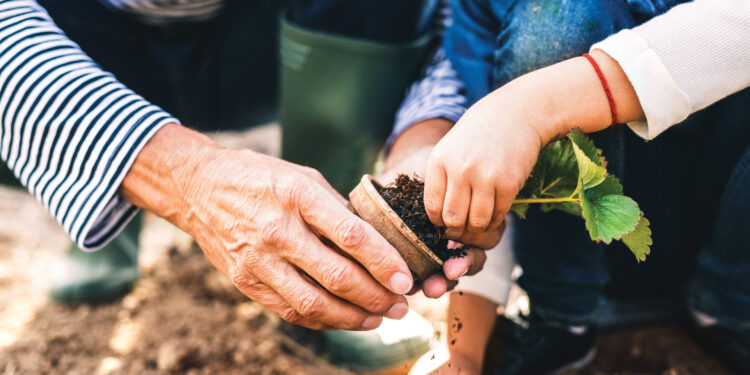Growing up in a rural farming community, the benefits of gardening were a regular part of life. All my grandparents grew a garden, canning and freezing their harvests. They made sure all the family had plenty of food.
Following them, I grew my first garden as a teen. The skills learned by working with them have given me memories and a great hobby that benefits my family. Each year, we grow a large vegetable garden and can plenty of fresh food for our pantry.
As we age, many feel they can no longer do some of the things they did in their younger years. None of us like to admit that it may be true to some degree, but many things we enjoy can still be accomplished on a smaller scale.
I can remember my great grandmother putting out a small garden, working with her flowers, and enjoying her grape vine and berry bushes with her each year. When she decided to move from her house to an apartment in a senior housing complex, she found friends who had a similar interest. They took care of the landscaping in certain areas and provided the hanging flower baskets for their gazebo each year. When they put out their flowers, she would proudly take the family to see them and tell us all about them.
The truth is, we benefit from gardening in many ways you may not think about. According to Senior Services of America, gardening is good for seniors and provides many physical and mental benefits. Gardening improves moods, helps relieve stress, stimulates the mind, increases energy levels, and improves our sense of well-being. Community gardens are a wonderful way to meet friends with similar interests and issues.
It is common for our dexterity to decrease as we age. Gardening is a wonderful way to combat this problem, because it requires the use of both fine and gross motor skills. The light exercise it takes to maintain any form of garden space daily is gentle impact and enjoyable. Gardening is versatile and can be adapted to space and ability.
In several studies, gardening has been shown to lower blood pressure and cholesterol levels, reducing the risk of heart disease and stroke. The physical activity of caring for a garden can be beneficial by reducing the risk of osteoporosis and improving bone density. Mental health has also been shown to improve when caring for a garden space both indoor and outdoor. Time outside allows the sunlight to kill germs and bacteria while giving a boost of vitamin D.
Gardening may be a way of introducing new foods into a person’s diet as well. Our family enjoyed learning about several vegetables we were not accustomed to but now enjoy eating. Of course, there is also the peace of knowing where some of your food came from and how it was grown. We have enjoyed sharing seeds and plants with others, as well as frequenting our local farmers’ market to learn and enjoy more.
Working with our hands has a therapeutic effect and can reduce stress and anxiety. Gardening also connects us with nature, which brings a balance to our lives. This may help to give a sense of purpose to seniors who often feel they no longer have value.
Conversations often come about because of gardening. The pride of growing that beautiful vegetable or flower, the satisfaction of eating something you grew, and sharing tips with others about growing such things are all benefits as well. Last fall, when we dug up our sweet potatoes from our garden after watching the vines all summer, we found out how blessed we were. The vines produced heavily, and we even found a few 2-pound sweet potatoes under the soil. I took pictures and shared them with some of the seniors I work with. They were amazed and we have had several conversations about the garden and the vegetables I grew. Some of them have been avid gardeners and took the opportunity to share what they had learned.
I found a few gardening tips for seniors provided by Lutheran Senior Services.
Be safe. Check with your doctor before doing any type of exercise, including gardening.
Take your time and do not overdo it. Stay hydrated when outside and try not to take on more than you can maintain.
Wear proper protective clothing and sunscreen while outside.
Be aware of and prepare for allergies.
With spring around the corner, I have my copy of The Farmer’s Almanac ready to plan my garden. I usually start planning in February and March to begin working the ground as soon as the weather breaks. This year, perhaps you will find that trying gardening is a new hobby you’ll love. Start small and enjoy the wonder it brings. OL










